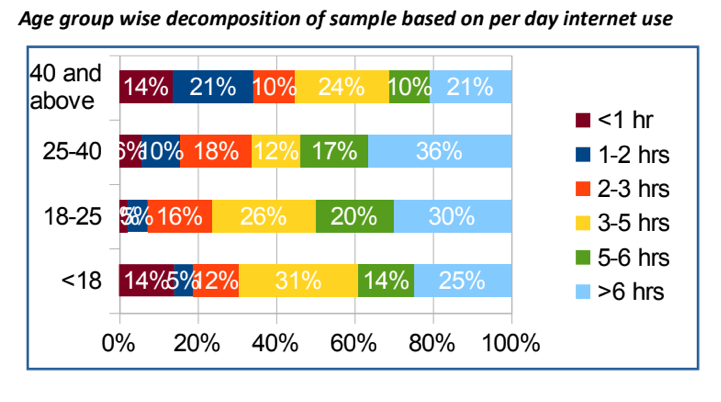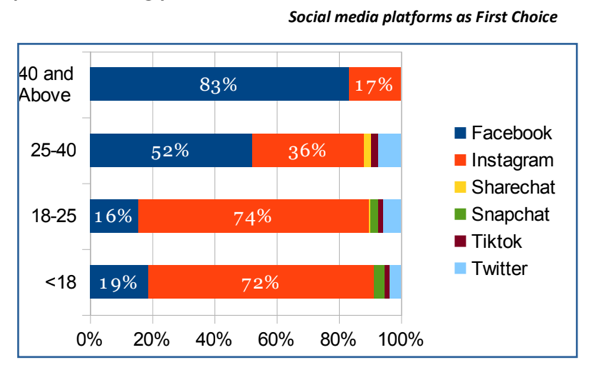Challenges in Teacher Education Today
Dr Mala Palani
Director, Indus Research and Training Institute, Bengaluru
A Renewed Case for Flipped Learning
Generation Alpha refers to the generation of children born after 2010. Children from this generation know how to look for information using the internet. They also know how to access the required information in a medium that will interest them and make their learning easier and fun. They use YouTube, Instagram and other internet-based tools to learn rapidly. Unlike a pre-internet generation that looked up to teachers to learn, this generation does not have that mindset at all.
Let us look at some data: according to a recent study called Patterns of Internet Usage Among Youths in India conducted by Institute of Governance, Policies and Politics, it was stated that children spend more than 6 hours using the internet (the 2 adjacent figures are from this paper). This is almost equivalent to the time a child spends in school. The findings in the study also point to the popularity of social media sites such as Instagram, Sharechat and Tiktok in this age group. 98% chose Youtube as the most popular internet site. And 78% said that they used internet to learn new skills.


What does this data tell to teachers?Teachers cannot continue to think that their vital role is to impart content knowledge. The internet can present the same content in much more interesting ways. Teachers need to therefore reimagine their roles. We can augment our performance by finally thinking of Flipped teaching more seriously. What parts can be learnt at home where the learner has little support and what parts can be learnt in the classroom where the learner has the support of the teacher, peers, and the ecosystem of the school – this can be planned better now. Clearly with interesting learning now being assigned to home in the form of Youtube videos to watch or a NatGeo movie to watch with clearly articulated aims and assessments, the teacher can ensure thorough learning of the content. In the classroom, the learning can be furthered through application-based activities like designing solutions. An example lesson could look like this:
| Aim:Understanding the impact of air quality on my life and identifying solutions and practical actions to address them. | ||
| At Home | In School | |
| Introductory Sessions (2 sessions) | a. What is India’s ranking in Air Quality? Read this report: https://aqli.epic.uchicago.edu/country-spotlight/india/b. How will this impact your life? Place your response on the Discussion Forum.c. Study the quality of air in your city. For e.g. look at the air quality in NOIDA: https://www.iqair.com/in-en/india/uttar-pradesh/noida/noida-sector-93bTurn on the location on your computer only for this activity and study the air quality currently in your town. What did you learn? Park your views on the Discussion Forum.d. Park the search words: crop residue burning in YouTube. Watch at least 2 videos discussing the topic.e. Is there a solution to this problem? Park your views on the Discussion Forum.f. What is the source of the solutions you have suggested? Internet, books, or are these your own, or did you come with the solution after discussing with family? Why did you think of using these sources? Write a 50-word reflection. | Discuss: What is one of the popular causes of air pollution in Delhi. Is there a difference between how landlocked areas are impacted by pollution than coastal areas? What is the situation of pollution in your town | village | city? What are the major factors impacting air quality in your town | village | city? What steps can we take to address at least one of the identified factors? Decision/Pledge:Every student will decide on one action/step (Ex. lesser use of AC, planting of saplings) that will help in arresting pollution at family/community/locality level. The class will collectively ensure the continuity of the action throughout the academic year. |
| Going forward the class will study on their own:– What is the composition of a healthy atmosphere? https://scied.ucar.edu/learning-zone/air-quality/whats-in-the-airThen, they will each calculate their family’s carbon emission based on their energy consumption. In the classroom: the students will discuss their carbon usage and plan thoughtful ways in which they can impact the usage to positively influence air quality. | ||
A constant dialogue is thus initiated within the student, among students, between the student and the internet, between students and the teacher, between the student and the family/society. What does this kind of lesson planning need?A little creative thinking. And loads of intentionality. Inspiring future teachers to let go of inhibitions, and engage in thinking creatively, with intentionality – is one of the biggest challenges in teacher education. Indus Training and Research Institute (ITARI) aims to nurture these important character traits of creative thinking and commitment, through the best teacher training programmes in international education – the Postgraduate Certificate in Education (PGCE) – International; the Postgraduate Diploma in Education (PGDE) – International; and the Master of Arts in Education (M.A.Ed.). Reference:Bohra, A. S. 2023. Patterns of Internet Usage Among Youths in India. Accessed 15 April 2023. https://www.socialmediamatters.in/patterns-of-internet-usage-among-youths-in-india